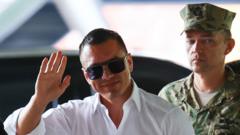Ecuador's recent presidential election concluded in a "technical tie," leading to a much-anticipated runoff between incumbent President Daniel Noboa and his left-wing challenger Luisa Gonzalez scheduled for April. The close result has caught observers off guard, starkly contrasting with pre-election opinion polls that suggested a more decisive lead for Noboa.
In the initial voting round, both candidates received nearly identical percentages of the ballots cast, forcing the electoral authorities to call it a tie. Noboa's supporters were initially hopeful of an outright victory based on early exit polls; however, those expectations quickly diminished as final results came in. In Quito, the atmosphere among Noboa's supporters was vibrant, with a sea of supporters displaying flags and holding life-sized cutouts of the president, which have become cultural symbols during the campaign.
Central to Noboa's presidency is his tough stance on crime, particularly the rampant violence associated with drug gangs in Ecuador. Supporters like Fernanda Iza praised his deployment of military forces to maintain order, stating, "He's helped us a lot, from when there was gang violence so bad that we couldn't even go out." Optimism about Noboa's chances in the runoff surfaced with Juan Diego Escobar predicting that many supporters of the eliminated candidates would back him for security reasons.
Conversely, Gonzalez, who has ties to former President Rafael Correa, has criticized Noboa for falling short on key promises—including economic improvement and effective crime reduction. She proposes similar policing strategies but emphasizes social spending to uplift the country's most troubled areas. Supporters like Gonzalo Cajas voice the call for change, urging that poverty drives crime and advocating for leadership that prioritizes worker welfare.
Polls indicate a significant segment of voters remains disenchanted with both candidates. Gabriela Cajo, reflecting this sentiment, argued that the election signaled ongoing frustration, stating, "Daniel Noboa represents fear, and we represent hope, change." This highlights the risk of a polarized environment in the lead-up to the runoff, a condition that could lead to further division in a country beset by crime.
Following the first round, both candidates face numerous pressing challenges irrespective of the election's outcome. Ecuador continues to battle significant drug-related violence as cartels vie for control over trafficking routes. Persistently high unemployment, a struggling economy, and an ongoing energy crisis pose additional hurdles to the incoming administration.
As Noboa and Gonzalez gear up for the decisive runoff, the stakes are high. With their contrasting visions for Ecuador, the ensuing political dynamics are likely to shape not only the immediate future of the presidency but also the broader socio-economic landscape of the nation.



















